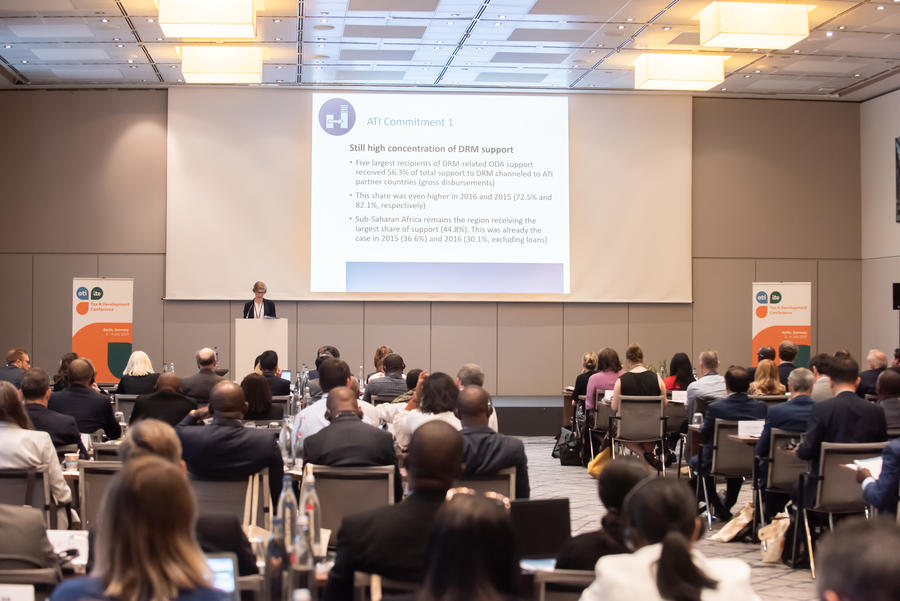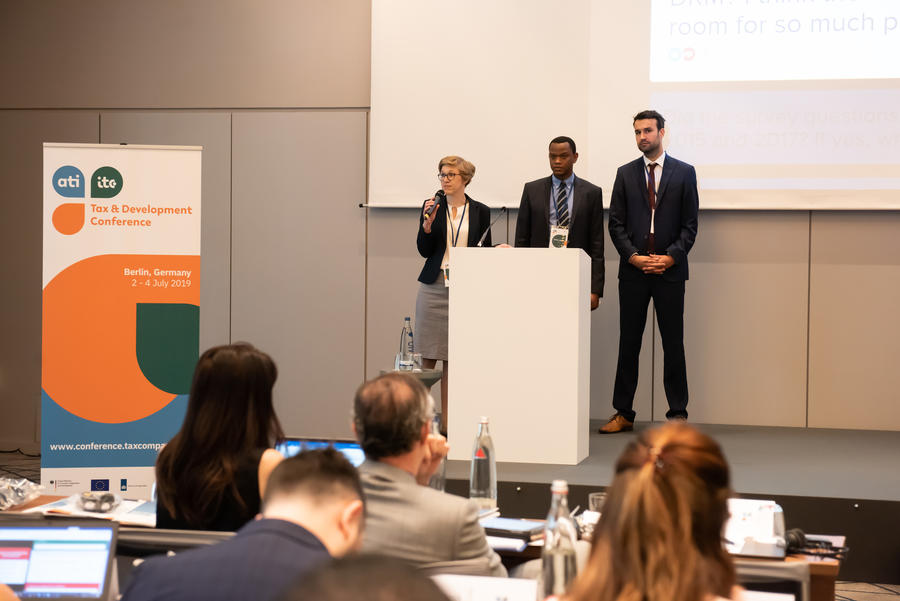Presentation of the ATI Monitoring Report 2017

Ms. Stefanie Rauscher, Coordinator of the International Tax Compact, presented the 2017 ATI Monitoring Report on the first day of the ATI/ITC Tax and Development Conference, which took place from 2 to 4 July 2019 in Berlin, Germany. Mr. Tobias Fleckenstein and Mr. Collen Lediga, Advisors at the Secretariat of the Addis Tax Initiative, assisted during the Q&A.
The ATI Monitoring Report provides a yearly update on the progress made by the ATI member countries in fulfilling the three ATI commitments. The ATI member countries use the report to share their implemented DRM reforms, achieved results and upcoming DRM priorities. The report also serves as a reporting mechanism on the support and contributions made towards domestic revenue mobilisation. In addition, the report also aims to contribute to the important need for added coordination and reporting of development partners’ support and contribution towards domestic revenue mobilisation. It also provides a platform for further deliberations on the impact of Official Development Assistance (ODA) support for domestic revenue mobilisation.
Ms. Rauscher opened the presentation of the 2017 ATI Monitoring Report acknowledging the efforts of ATI member countries in making available the information used to compile the report, by updating their respective data on the OECD Development Assistance Committee (DAC) Statistics and populating the ATI Monitoring Surveys sent by the Secretariat of the Addis Tax Initiative. The following key findings summarise the progress made towards attaining the three ATI commitments.
ATI Commitment 1
- While ATI development partners’ commitment to DRM support stood at USD 258.22 million in 2017, the gross disbursements amounted to USD 260.41 million. In comparison to the 2015 ATI baseline year, this indicates an increase of USD 45.20 million (21%) in disbursement and a USD 56.91 million (28%) increase in commitments.
- ATI development partners account for 93% of all OECD DAC members’ gross disbursement and 83% of commitment made towards DRM support in 2017.
- 98 countries received official development assistance (ODA) support to DRM from ATI development partners, with 35% (USD 91.9 million) gross disbursements going to ATI partner countries.
- The results of the report demonstrate that the ATI development partners have dedicated considerable amount of resources toward supporting DRM efforts through various project in both ATI and non-ATI member countries. The report acknowledges the point raised by ATI development partners that there is a considerable time lag between political commitments made and the required budgetary adjustments, planning and implementation of projects in support of this commitment. Further, ATI development partners expressed that, despite the time lag, they are optimistic about fulfilling their commitment to double their support to DRM reforms by 2020.
ATI commitment 2
- Tax-to-GDP ratio in ATI partner countries has experienced an improvement since 2015. However, this improvement is not enough, since more than half of the ATI partner countries have a tax-to GDP ratio well below 15%, which falls short of the ratio required to drive sustainable growth. Of the 23 ATI partner countries, only 4 countries have a tax-to GDP ratio of 20% or above.
- Indirect taxes form the largest share of total revenue, accounting for 45.5%. Direct taxes account for 34.2% of total revenue.
- The Addis Tax Initiative promotes the use of the Tax Administration Diagnostic Assessment Tool (TADAT) to assess the strengths and weaknesses of tax administration systems and measure progress under the ATI Commitment 2. Out of the 23 ATI partner countries, 17 have concluded TADAT assessments as a means of enhancing their DRM efforts.
- ATI partner countries have undertaken reforms in the areas of taxation, digitalisation, simplification of tax procedures, capacity building, tax audit and compliance. Countries have also prioritised building capacity to implement international standards, frameworks and agreements, such as the BEPS Inclusive Framework and Automatic Exchange of information (AEoI).
ATI commitment 3
- ATI member countries (23 of 25 respondents) have formal and/or informal coordination mechanisms for domestic revenue mobilisation in place.
- 24 ATI member countries reassured their commitment to work on coherent policies and combat illicit financial flows.
- ATI member countries report progress in the areas of exchange of information and BEPS are important working domains and.
- 10 of 26 responding ATI member countries have a tax treaty policy in place that looks specifically at policy coherence for development.
- Health, trade and gender are other topics in the area of policy coherence with respect to domestic revenue mobilisation that are pursued by ATI member countries.

